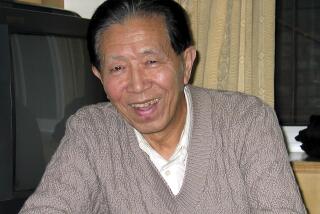Yang Shangkun; Former Chinese President
- Share via
BEIJING — Former Chinese President Yang Shangkun, a once-powerful army general purged earlier this decade by the late Deng Xiaoping, died Monday in Beijing at 91, state media reported.
Viewers tuning in to the evening news on state television were cued to the death of a top official by the funeral dirge that is standard on such occasions. After a black-and-white photograph of Yang was shown, a somber anchorman in a black tie read his obituary.
The official obituary hailed Yang as a “great proletarian revolutionary, statesman and strategist, a staunch Marxist and an outstanding leader of the party, the state and the People’s Army.”
As with most such obituaries, an unspecified illness was cited as the cause of death. Despite his advanced age, Yang was the most vigorous among the “eight immortals,” a group of powerful party elders whose few surviving members have been reduced in recent years to serving as occasional government advisors.
While his post as president was largely ceremonial, Yang and his half-brother, chief political commissar Yang Baibing, headed the dominant faction in the military--known as the Yang Family Generals--in the early 1990s.
Fearing that the Yang clan might scuttle his plans to have Communist Party Secretary Jiang Zemin succeed him after his death, paramount leader Deng Xiaoping stripped the two brothers of their party posts and reshuffled a number of military commanders affiliated with them in 1992. Yang Shangkun retired as president the following year. Deng died in February 1997.
Yang was born to a prosperous family in the southwestern Sichuan province in 1907. He joined the Communist Party at 19 and went on to study at Sun Yat-sen University in Moscow, where he learned Russian. Yang survived the epic 1934-35 Long March and rose through the ranks as a political commissar and party functionary during the war years.
With the founding of the People’s Republic in 1949, Yang became director of the Communist Party’s general office, where he handled internal party affairs for 17 years.
During the 1966-76 Cultural Revolution, Red Guards accused Yang of tapping Chairman Mao Tse-tung’s phone and sent him into 12 years of political exile.
During the 1980s, Yang, still a People’s Liberation Army general, was second in charge of the military under Deng. At that time, Yang played a vital role in streamlining the then 3-million-strong army into a more modern force.
He entered the elite Communist Party Politburo in 1987 and was appointed president in 1988.
Early on in the pro-democracy student protests of 1989, Yang is said to have agreed with then-Premier Zhao Ziyang that the student movement was patriotic and well-intentioned, not a “counterrevolutionary rebellion,” as the hard-liners tagged it.
But when Deng decided to quash the protests, Yang toed the line and played a key role in orchestrating the military crackdown in Beijing.
More to Read
Sign up for Essential California
The most important California stories and recommendations in your inbox every morning.
You may occasionally receive promotional content from the Los Angeles Times.










